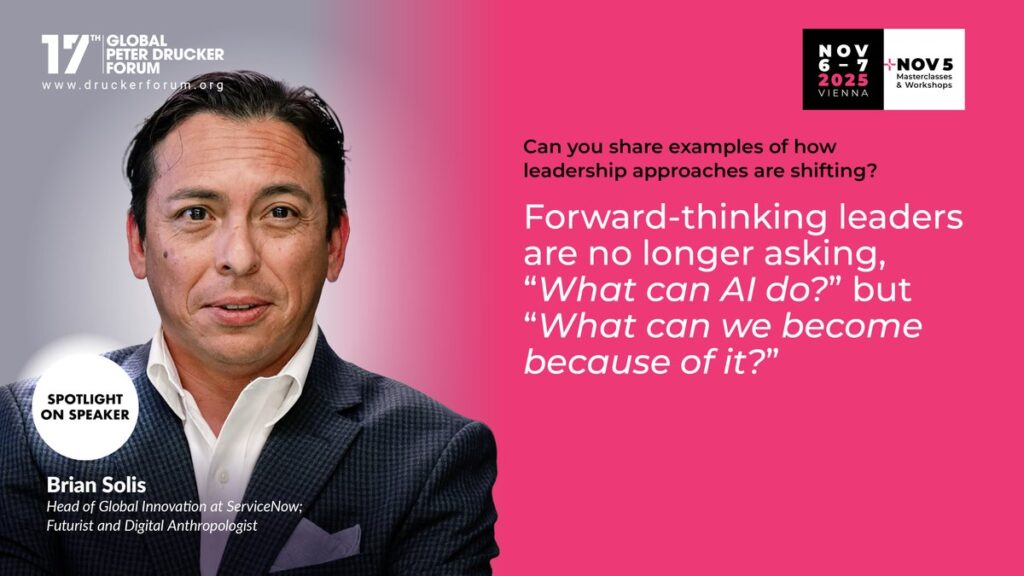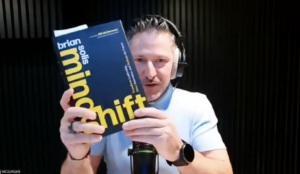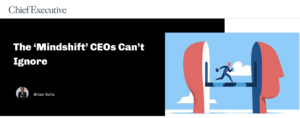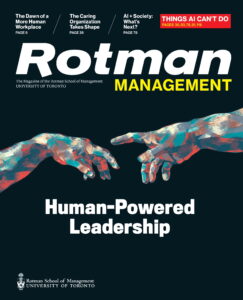
It’s been a dream to meet my idols, fellow peers, and also present at the Global Peter Drucker Forum. In 2024, Richard Straub and Julia Kirby made that dream a reality. And in 2024, we were just about two years into generative AI disruption that continues to disrupt enterprises and management thinking globally.
I’m proud, and more than ready, to return in 2025. And in the one short year it’s been since I’ve last joined this incredible group of academics, business leaders, my work at ServiceNow has focused on further documenting enterprise AI maturity, I published my first book in five years, Mindshift: Transform Leadership, Drive Innovation, and Reshape the Future, and I’ve launched several new initiatives that study how executives are, and should navigate AI business transformation.
In the lead-up to the 2025 Global Peter Drucker Forum, I spent time with the crew organizing the event. They worked with this year’s speakers to better understand how to help attendees and those they represent navigate the next year ahead. Here’s what I had to say, and I didn’t hold back…
Whether you’re attending the event, and I hope to see you if you are, or not, I’m sharing this unabridged interview with you so we can influence what happens next, together. ✨
We invite you to share your perspective on our annual topic, “Next Era Leadership: All Hands on Deck,” by reflecting on the following questions…
Q: Can you please share 5 sentences that describe your session:
1. We stand at the threshold of a new leadership era, one where AI is exposing the limits of legacy thinking and legacy leadership, but the first stop for any “leader” is self-awareness…to ask themselves:
“Are we using AI to improve the past or invent the future?”
“Do we deploy AI to shrink our workforce, automate yesterday’s work, and chase quarterly gains or do we use AI to augment human potential, pursue exponential outcomes and gains, and invent entirely new sources of value?”
2. Peter Drucker said, “The greatest danger in times of turbulence is not the turbulence; it is to act with yesterday’s logic.” AI is that turbulence, and while many leaders respond with yesterday’s logic, the invitation to define the future is to lead with tomorrow’s logic. It starts with a mindset shit or a ‘mindshift.’
3. The future doesn’t need more managers to manage against yesterday’s processes, work, and standards; it needs architects of possibility who can lead in an age of intelligent machines and infinite potential. We need leaders willing to imagine, wonder, ask new questions and empower people around them to do the same.
4. AI doesn’t change businesses, leaders who dare to imagine business differently will use AI to change the business. It starts by rewriting the human algorithm of leadership itself, from management by control to leadership by curiosity, empathy, and empowerment. The true potential for next leadership is unleashed in how human creativity and machine intelligence can work in harmony to achieve what neither could alone.
5. In the next leadership era, success won’t come from scaling efficiency, but from scaling imagination… rethinking value creation, culture, and management itself through the lens of AI and augmentation.
Bonus: Drucker believes that the most valuable asset of a 21st century institution is its knowledge workers and their productivity. AI offers the ability to do more than automate repetitive tasks and improve productivity, to break free from static knowledge work…to imagine AI as a collaborator and a catalyst for enabling outcomes not possible before. If AI can do what you do, then what is it that you contribute? Knowledge now is about how fast you can learn, unlearn, imagine, and apply new creativity and understanding.
Q: How does your work help reshape management practices?
I base a lot of my work, thinking, and experimentation on the disruptions happening in Silicon Valley by AI Native and AI First companies.
My work challenges leaders to see AI not as a technology to manage but as a catalyst to reimagine management itself. We start by embracing an “AI Forward Mindset.” This means means prioritizing the use of AI in exploring possibilities not achievable without it…and outcomes AI couldn’t achieve without you.
For too long, we’ve optimized for efficiency and productivity, not potential or the unknown. AI gives us the mirror to reflect on self-awareness, vision, and self-actualization. I outline what was, what is, and what could be with AI to redesign work, culture, and leadership around creativity, empathy, and adaptability….to iterate by automating yesterday and innovation by augmenting possibility and exploring new value creation.
In Mindshift, I write that transformation begins not with technology, but with mindset. Management must evolve from directing resources to developing new capacities, human and digital alike.
In Drucker’s terms, we must stop “doing things right” and start “doing the right things.” In an era when AI can perform much of yesterday’s work, we must imagine and do things differently.
For decades, management has been about optimizing for efficiency, doing things right, taking out costs, scaling capacity, increase speed. But in the age of intelligent machines, doing things right is the new status quo, just powered by AI. We must learn to do the right things differently.
Moving forward, it’s a balance of iterative AI and innovative AI.
Iterative AI strategies are purpose-built to solve real business challenges and improve everyday workflows. It removes the routine and complex, enabling faster, more efficient, productive, value-added work. Innovative AI investments aim to create entirely new products, services, or business models. It enables organizations to reimagine value creation by uncovering opportunities that were previously impossible or impractical, leading to exponential growth and competitive differentiation.
Q: What’s your ideal or utopian vision for the future of management?
My utopian vision is one where management becomes one of human + AI orchestration and augmentation, not limited by administration and automation…a rebirth of human creativity and imagination co-powered with AI.
I would like to see a future where managers aren’t the bottlenecks of bureaucracy but the liberators of creativity.
Imagine leaders as designers of human-machine collaboration, embedding emotional intelligence into systems of artificial intelligence.
Organizations will evolve into “AInfinite Companies,” infinitely scalable, infinitely adaptable, infinitely human.
In this world, Drucker’s wisdom finds new form: management is no longer about controlling outcomes, but cultivating new possibilities.
Managers of the future will orchestrate intelligence, combining human creativity with machine precision to build companies that are infinitely adaptive.
In Drucker’s spirit, I’d say this: Management was once about getting people to follow. In the next era, it’s about empowering people, and machines, to co-create the future.
And those who lead with curiosity, those who dare to mix disciplines, ideas, and imagination, are the ones who will define what comes next.
Q: Can you share examples of how leadership approaches are shifting?
Forward-thinking leaders are no longer asking, “What can AI do?” but “What can we become because of it?”
At companies I work with, we see “human + AI” teams forming new value networks, where digital employees handle precision, and humans handle perception.
CEOs are becoming “Chief AImagination Officers,” learning to experiment publicly, unlearn openly, and lead empathetically through uncertainty.
These are not tech transformations, they’re cultural awakenings. The leaders who thrive will not be those who manage change but those who visualize, articulate and inspire, and embody it.
Q: What quote or motto captures your management approach and the Forum’s “All Hands on Deck” spirit?
“AI will expose managers who think like machines. You can’t manage your way toward reshaping the future. You can’t automate your way to innovation. The future doesn’t need more managers. It needs architects of possibility. The future of leadership is about mobilizing potential. In this age of intelligent machines, it’s all hands on deck, human and digital, to reimagine what leadership means and what humanity can become.”
Or, borrowing Drucker’s timeless pragmatism for an age of AI: “In times of AI, the most human leader wins.” 🙌
Tickets are still available, use code “Social2025” for a special discount (RSVP HERE)
Mindshift | Keynote Speaker | Newsletter





These are not tech transformations, they’re cultural awakenings. The leaders who thrive will not be those who manage change but those who visualize, articulate and inspire, and embody it.
leadership is clearly moving from managing tools to shaping mindsets